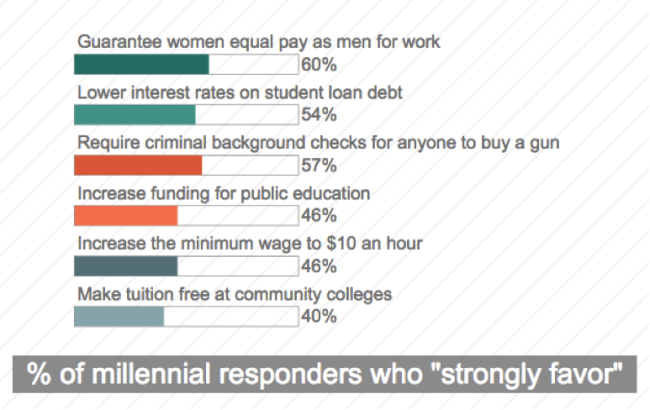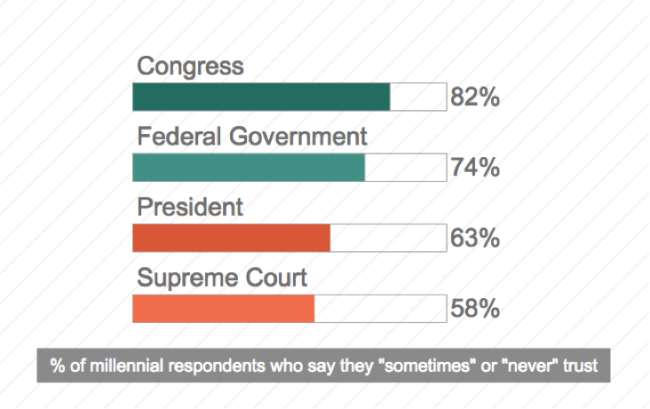
It is election season and millennials have the potential to play a significant role in determining the next president. In the 2016 election millennials will account for 36 percent of the eligible voting population, according to the Center for American Progress (CAP).
The challenge: convincing the 81 million Generation Y voters to actually turn out and vote.
Millennials have come of age in an era of technological innovation and ethnic diversity, but one plagued by economic hardships. They’ve witnessed the worst terror attack in American history, long-running wars, and increasing wealth inequality. They must compete in a competitive global economy where jobs are harder to find. They’ve also watched two antagonistic political parties in Washington refuse to work together to solve some of these problems. It’s no wonder that statistics show that millennials have extremely low levels of trust in the government. Persuading them to vote may be easier said then done.
“Millennials feel like neither the Republican or Democratic Party really has a compelling answer about how to make their future better,” said Matthew Wilson, a professor of political science at Southern Methodist University.
The CAP found that in the 2012 election millennials had 64 million eligible voters, yet only 26 percent of them actually went to the polls. Almost 75 percent of millennials didn’t vote, yet they still played a significant role determining the winner in key states such as Florida and Ohio.
Fariooz Adams, President of SMU College Democrats, said politics to many millennials isn’t terribly thrilling.
“Unlike in sports, the results of a play or pass aren’t immediately apparent. Public policy often takes years or decades to actually have an impact,” said Adams.
Politicians on both sides of the aisle are desperate to connect with this generation but are struggling to figure out who exactly they are and how best to reach them. Mary Crane, owner of Mary Crane Associates a consulting firm that specializes in helping millennials transition from school to work, said the real question of the 2016 election is if a candidate can convince millennials that this election is about them.
“In the past two national elections we have learned that millennials are very politically engaged if you get them on national topics that are of interest to them,” said Crane.
This generation has come of age in an era of great ethnic and social diversity. The millennials are the most socially diverse generation in American history and one that doesn’t recognize traditional sexual and gender norms. Sixty-eight percent of Gen Y’ers support same-sex marriage and 69 percent support legalizing marijuana.
“The candidates must talk about issues that millennials care about, and start taking policy positions that millennials are likely to have,” said Adams. “That means shifting left on a whole range of issues.”
According to a survey conducted by Harstad Strategic Research, Inc., more than 50 percent of millennials identify as political independents. They overwhelmingly support progressive policies that promote opportunity and economic security.
Millennials have grown up with a faltering economy, a middle class that is no longer secure, and a gap between the rich and the poor that grows larger everyday. According to a study by the Pew Research Center, millennials are the first in recent memory to experience more student debt, poverty, and unemployment, as well as diminished wealth and income, than the two generations before them.
“The problem is nobody, on the Democratic or Republican side, has an answer to the question how are you going to create job opportunities for people in their twenties?” said Wilson.
Even if candidates did have an answer to this question, it is unlikely millennials would trust them to follow through. A survey conducted by Harvard’s Institute of Politics found that millennials have extremely low levels of trust in the government.
Steven Rayshell, President of Dallas County Young Republicans, said millennials feel this way about the government because they have grown up in an era of hyper partisanship.
“Millennials see two groups of people that haven’t been willing to work with each other for a very long time and they are tired of it,” said Rayshell.
Millennials grew up in the post 9/11 era, an era where the deadliest terror attack in American history was only able to bring the parties together for a very brief period of time. Wilson said millennials have lived their whole lives in a world where political leaders are more focused on winning the day rather than winning the policy debate.
“Politicians are constantly looking to undermine or discredit the opposition, rather than advance compelling ideas,” said Wilson. “And given that this has been the political climate for the majority of their lives, it has been pretty easy for millennials to want to disengage.”
Crane said if candidates want to engage millennials, they have to start communicating with them in the manor they are grabbing their news now. Statistics show most millennials do not visit news sites, do not read newspapers, and do not watch television news.
“Millennials are getting information through social media. Candidates needs to ask themselves ‘what am I selling?’ and then sell it to millennials through the web,” said Crane.
The Media Insight Project, an initiative of the American Press Institute, found that 88 percent of millennials get news from Facebook regularly and more than half of them do so daily. And Facebook isn’t the only social network site millennials use for news. Respondents said they also regularly get news from YouTube (83 percent) and Instagram (50 percent).
“We just want to be acknowledged directly. That would go a long way,” Rayshell said.
Obama championed millennials in 2008 and 2012, largely because he communicated with this generation in the way they wanted. The 2008 election is commonly known as the “Facebook election,” because of the Obama campaigns overwhelming success using the web to rock the youth vote. Exit polls revealed that Obama won nearly 70 percent of the millennial vote in 2008, the highest percentage since U.S. exit polling began in 1976. He has also connected with millennials by conducting interviews with sources like Vox.com and Buzzfeed.
Adams said the best way to engage millennials would be to meet them on their own level.
“Selfies. And lots of them,” he said.










